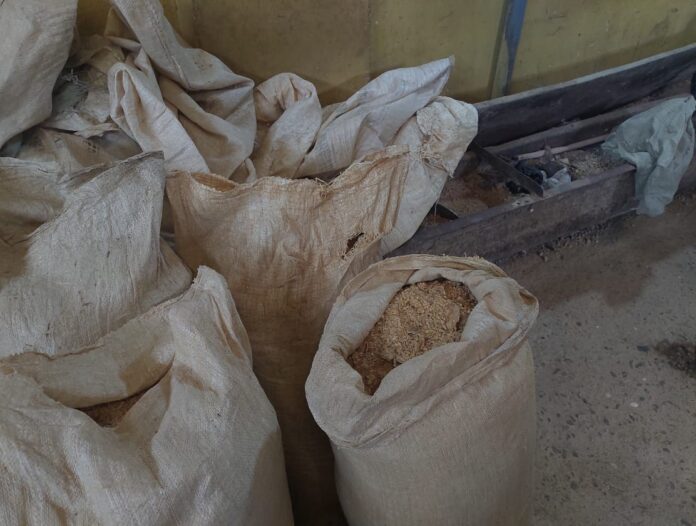There is a shortage of soya beans in the Ashanti region.
This is causing processing factories to either shut down operations completely or reduce substantially their production capacity.
GBC News has visited premises of two of such soya bean processing companies to learn firsthand the seriousness of the issue, which is being blamed on the sudden high export of the commodity to India and other Asian countries for higher prices and the effects of the recent dry weather in the northern part of Ghana.
Soya beans are one of the legumes produced mainly on a commercial basis in parts of the country.
It is the raw material for industrial processing into cooking oil and the source of protein for poultry and fish, with the Ashanti region hosting some of the factories.
One of them is the Vester Oil Mill at Deduako near Kontanase in the Bosomtwe district.
It has been in operation since 2007 with a current processing capacity of 100 tons of soya beans a day.
It processes the soya beans into both refined and crude oil for domestic and industrial uses with the soya cake or meal, which is the bi-product used by poultry farmers as protein-rich meal for their births.
At the visit of GBC News to its premises, even though production was ongoing, with a handful of staff at work both at the administration and factory, it was gathered that that was not the actual level of production on a normal day.
The Chief Executive Officer of Vester Oil Mill, Akwasi Nyamekye, told GBC News that the company, with a workforce of 120, both at administration and operations, runs three shifts at optimal production level.
According to him, in the last three months, production has substantially reduced, affecting payment of wages for inadequate raw materials.
“What you heard is true. We don’t have raw materials. For the past three months we’ve not been working. I’ve 2 plants. One mechanical expeller at Aputuogya and here where we’re now at Kontanase Deduako, another plant that is designed for 100 tonsa day. We also have a refinery where we refine Oil here. The capacity of the refinery is 20 tons a day. I’ve no choice but let some of the workers go home,” the CEO confirmed.
The workforce is sourced basically from the catchment communities, with the youth and women being the major beneficiaries. Some of them spoke to GBC News about how the shortage of raw materials is affecting them.
The Production Supervisor, Umar Francis Hafiz, noted, “Because there’s no production, most of the workers are at home. The cost of living has become very difficult as a result. Even while earning income, it’s never enough.”
‘I’ve been able to use what I earn here to cater for my children’s formal education. This work has indeed supported me. I feel for our employer for the loss he’s incurring due to the lack of raw materials, and we’re also bearing the brunt,” said a female factory hand, Faustina Abobozi.
At another soya beans processing factory, Thomas W. Bellow Enterprise at Kyirapatre in the Asokwa Municipality,GBC News observed that there was no production taking place with only a security man and the Chief Executive Officer at post. The machines were redundant.
The Chief Executive Officer, Thomas Bellow, confirmed that there is shortage of soya beans, the raw material for his production, and blamed the situation on factors including sudden high demand for the Ghanaian soya beans considered to be of premium quality in India and some other Asian countries who are offering higher prices for the commodity.
“The workforce, for now, we’ve six permanent people. When the raw materials are available, we engage four more hands to help. Now, where’s the raw materials to run the 3 shifts”. ”And even the machines’ strength has gone done so we can’t do full capacity. The machines could process about 25 tons a day but now, it could do only a maximum of 10 tons The machines could process about 25 tons a day but now it could do only between 6 and 10 tons a day,” he lamented.
The CEO of Vester Oil Mill, Akwasi Nyamekye, who is also the Ashanti, Bono, Ahafo, and Bono East Zonal Chairman of the Association of Ghana Industries, AGI, called for deliberate state policy to guarantee the commodity to sustain local processing factories.
He suggested, “I think the solution at this stage, if you asked me, is multi faceted approach. Government’s policy direction could help by buying, keeping and selling the Soya beans to us.
Another line is the banking sector, which is supposed to finance some of us, because, when the season begins like this and you have money, you can even buy the Soya beans and process… if I go down, I go down with so many people and their families.”
GBC News’ further checks have revealed that several other soya beans processing factories in the Ashanti region are also struggling to sustain business due to the shortage of the commodity.








